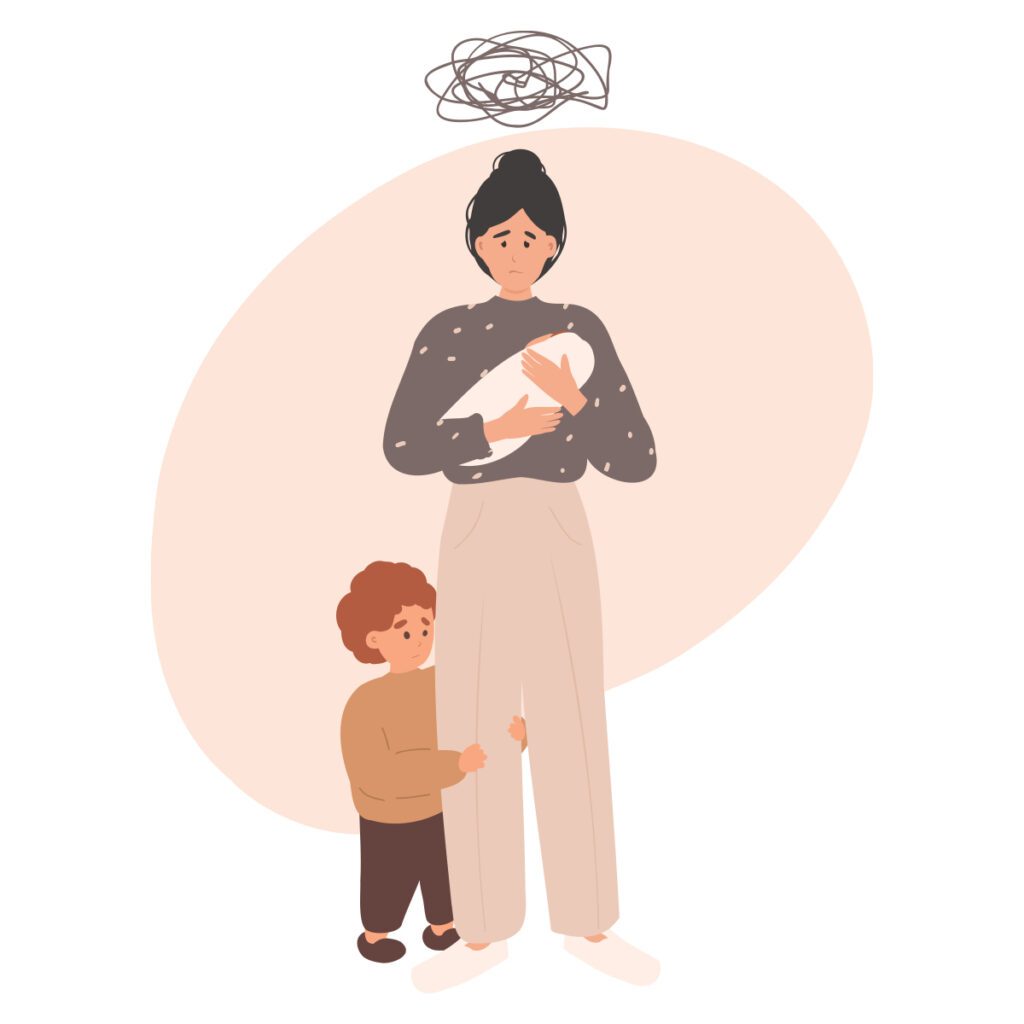Beyond the Baby Blues
Most people have heard of postpartum depression, but postpartum anxiety is believed to be just as common, and it can be just as disruptive to the lives of new parents. Here, we spoke with local experts to learn more about identifying postpartum anxiety and how to get help for yourself or a loved one.
What Is Postpartum Anxiety?
Mood changes often result from the natural hormone fluctuations that occur after giving birth. Temporary feelings like sadness, irritability, or worry, often called the “baby blues,” affect up to 85% of new mothers as their bodies recover post-pregnancy. But when symptoms become exceedingly disruptive or don’t go away after a few weeks, they can be signs of a more serious condition.
Anxiety is the body’s natural response to threats of danger, but anxiety disorders cause this feeling even when no threat is present. With postpartum anxiety (PPA), the focus of this anxiety tends to be on the baby’s well-being, often with intrusive thoughts that the baby is in constant danger. This can manifest as restlessness, irritability, and an inability to relax – even in quiet moments. Dr. Anna K. Melnikoff of Galen Obstetrics & Gynecology advises, “If these feelings are overwhelming, frequent, or interfere with one’s daily thoughts or relationships, then it is time to speak with a health professional.”


Postpartum anxiety is an anxiety disorder that typically occurs after giving birth, and it’s more common than many people realize – studies indicate that the condition affects between 11% and 21% of people after giving birth. The condition can affect any parent, even those who did not carry and deliver the baby themselves.
Is It Postpartum Anxiety or Just New Parent Worries?
Unfortunately, PPA is often written off as a normal part of the new parent experience or something to be expected when a new child is added to the family. New parents expect the first stage of parenthood to be a big adjustment, and this can make it harder to separate disorders from the typical experience. “There’s the thought that ‘maybe this is just part of being a mom’ or ‘maybe this is just hard now because I have three kids.’ With postpartum anxiety, these fears and feelings begin to impede your daily life,” explains Natalie Battles, LCSW, of Roots Counseling Center.
“A lot of the focus with postpartum anxiety can be centered around the baby; baby’s sleep can be a big trigger and a big focus, as well as how much they’re eating and whether or not they’re meeting the typical milestones,” Battles explains. “But then a lot of the focus can also be on the mother and her own self – the identity shift that she goes through during the postpartum time.” While these concerns are certainly not abnormal on their own, when they become obsessive or intrusive thoughts that interrupt daily life or negatively impact relationships, they are certainly a sign of PPA.
Many people believe that postpartum disorders all involve thoughts of harming the baby, but this is a misconception.



PPA and other disorders in the postpartum family do not have to be that extreme to be clinically significant, and it is certainly best to seek treatment before the disorder gets to such a critical point. “Postpartum psychosis, in which a patient may experience hallucinations, delusions, manic episodes, or have suicidal or infanticidal ideations, is rare. However, this is a severe potential complication, especially in patients with any history of postpartum psychosis or bipolar disorder. If a new mother is experiencing any of these symptoms, she should seek help immediately,” Dr. Melnikoff advises.
Physical Symptoms
- Difficulty sleeping
- Nausea or stomach pain
- Shortness of breath
- Decreased appetite
Behavioral Symptoms
- Inability to rest or be still, even in quiet moments
- Excessively controlling behaviors
- Being overly cautious in situations that are not dangerous
- Avoiding certain places they did not previously avoid
Emotional Symptoms
- Inability to relax or stay calm
- Racing and/or intrusive thoughts
- Feeling on edge or constantly fearful
- Difficulty focusing or forgetfulness
Getting Help
Whether you’ve noticed symptoms for yourself or a concerned friend or loved one has brought them to your attention, it is important to remember that there are options for treatment. “The most important thing a patient can do is be open and honest with her provider about her symptoms. Early counseling, routine physical activity, support groups, and medication may be considered, but each patient’s experience and needs are different. Importantly, if a patient is already taking medication, they should consult a health professional before stopping any medication. Most mental health medications can be safely continued during pregnancy and in the postpartum period, and this can significantly help reduce the severity of symptoms,” Dr. Melnikoff shares. “Often, my patients will say they did not want to come in because they felt like they needed to ‘wait it out.’ It is never too early or too late to seek help.”



New parents are often faced with societal pressures which can make it difficult to accept that they may need help. “There’s a lot of stigma around motherhood in general. People say things like ‘oh, enjoy it!’ or ‘you’re going to miss it!,’ and this can make some mothers feel worse about themselves because they’re not enjoying it,” Battles explains. “One thing I would like every mother with postpartum anxiety to know is that you’re not a failure. You did nothing to cause this. There’s nothing wrong with you, and you’re not broken. Becoming a new mother is really hard. Becoming a second- or third-time mother is also really hard, but it doesn’t have to be this hard. With support the load can be lightened, and with help you will be well.”



Anna K. Melnikoff, MD, FACOG
Obstetrics & Gynecology Specialist, Galen Obstetrics & Gynecology



Natalie Rothwell Battles, LCSW
Licensed Clinical Social Worker, Roots Counseling Center

